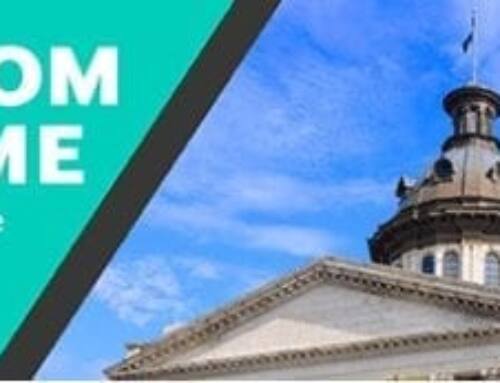Friday, Sept. 25, 2020
The General Assembly completed a special two-week legislative session and does not have plans to return until January.
In addition to passing a handful of bills, including a plan to expand broadband access to rural areas, the chambers agreed on the authorization for the remaining CARES Act funds.
While the Senate adopted a new state budget, the House decided to wait until next year and allow the Continuing Resolution to remain in place.
accelerateSC is a one-stop website to help businesses and citizens connect to important information during this crisis.
TAX CONFORMITY
The annual tax Conformity legislation was adopted by the General Assembly on Tuesday when Senator Thomas Alexander (R-Oconee) added the language to a Senate bill that had returned after being amended by the House.
The original bill, S.545 (Senator Alexander), related to assessing property of businesses and other entities and requires all counties to use the DOR-approved PT-100 form for filing business personal property assessments. The bill was amended by the House last week to forgive and exclude gross income from the federal paycheck protection program (PPP) for federal and state income tax purposes. Further, to the extent the federal government allows the deduction of expenses associated with the forgiven PPP loans, these expenses will be allowed as a deduction for South Carolina income tax purposes.
The bill does not conform to one provision relating to a temporary suspension on limitations to charitable contributions associated with qualified disaster relief, which can be revisited in January.
The bill now goes to the governor.
BUDGET
The House of Representatives referred H.5201, the General Appropriations Act, to the Ways and Means Committee on Tuesday, effectively killing the bill for this session. The Senate had passed an amended version of the state budget last week.
House leaders and Gov. Henry McMaster have argued the General Assembly should not appropriate any estimated revenue due to the uncertainties in the economy caused by the pandemic and the potential for further cuts. The move means that for the remainder of the calendar year, state government will continue operating under the terms of the Continuing Resolution.
The Senate had included new funding for teacher pay raises, state employee hazard pay bonuses, corrections, local government and school nurses in their amended version. The Senate had also directed the expenditure of the $775 million estimated one-time surplus, setting aside $500 million to a midyear shortfall reserve fund to prevent state agency budget cuts in the event of an economic downturn.
House Ways and Means Committee Chairman Murrell Smith (R-Sumter) left open the possibility of passing a budget in January for the remainder of the current fiscal year once the state has six months of tax collections and more certainty to move forward.
GENERAL BUSINESS
Both chambers adopted a Conference Report on Wednesday to resolve the differences in legislation relating to business license tax standardization H.4431 (Reps. Jordan, Fry, Rose, Forrest and others).
The bill, a high priority for the business community, has been under discussion for several years by numerous stakeholders and seemed poised to finally become law until objections were raised last week regarding certain prohibitions for third-party vendors under contract with smaller municipalities to collect the taxes. The compromise agreement would allow third-party collectors to receive contingency fees, a change that prompted the State Chamber of Commerce who had been pushing the legislation to remove their support for the bill.
The bill now goes to the governor.
CARES ACT AUTHORIZATION
The General Assembly this week adopted a Conference Report on H.3210, Phase II authorization of the remaining funds from the federal CARES Act. The plan includes:
- $420 million – Unemployment Insurance Trust Fund
- $115 million – Local governments and colleges mitigation
- $73 million – DHEC statewide testing and monitoring
- $20 million – MUSC statewide testing
- $25 million – Grant program for non-profits (food, rent, housing, utilities, mental health, behavioral health, arts and culture grants from $2,500-$50,000)
- $40 million – Minority Relief Grant Program funding
The House conferees to serve on the conference committee were Representatives Murrell Smith (R-Sumter), Kirkman Finlay (R-Richland) and Bill Clyburn (D-Aiken). The Senate conferees were Senators Thomas Alexander (R-Oconee), Vincent Sheheen (D-Kershaw) and Tom Davis (R-Beaufort). The bill now goes to the governor.
CORONAVIRUS
To view all of the governor’s previous Executive Orders, click here.
For more information from SC DHEC on the virus, click here.
The DHEC Care Line is available to provide general information about COVID-19 by calling 1-855-472-3432 from 8 a.m.-6 p.m., seven days per week.
COVID-19 Screening & Testing Sites
Other helpful links:
The Emergency Management Division provides links to important information, including the SC Department on Aging, SC Childcare, the SC Department of Employment and Workforce, the Department of Revenue and the SC Department of Insurance.
South Carolina Department of Commerce for small business information and assistance.
For additional resources that may be beneficial to your organization’s recovery efforts, visit Haynsworth Sinkler Boyd’s COVID-19 Resources page.
South Carolina Health Alert Network
South Carolina COVID-19 Emergency Supply Sourcing & Manufacturing
TELECOMMUNICATIONS
Major legislation to expand broadband service in rural areas of the state was worked out and agreed to by both chambers in the final hours of this year’s legislative session. A Conference Report was adopted on H.3780 (Reps. White, Hixon, Taylor, Cobb-Hunter and others), creating the “Growing Rural Economies with Access to Technology (GREAT) Program” to facilitate the deployment of broadband service to unserved areas of the state. The bill incentivizes providers to build and deploy quickly. It is estimated that approximately 190,000 homes in South Carolina do not have broadband service. The Office of Regulatory Staff (ORS) is vested with the authority to ascertain the compliance of communications service providers, electric cooperatives and broadband affiliates. The bill now goes to the governor.
In addition to broadband, the legislature this week approved H.4262 (Reps. Simrill, Rutherford, Sandifer and others), which enacts the “South Carolina Small Wireless Facilities Deployment Act.” The bill deals with the deployment of small cell and wireless facilities and other next-generation (5G) wireless. The bill establishes uniform rates and fees for the permitting and deployment of small wireless facilities in the right-of-way and on authority infrastructure, including poles, throughout the State. The bill now goes to the governor.
ENERGY
The House concurred in the Senate amendments to H.4940 (Reps. Sandifer and Forrester) on Wednesday. This Joint Resolution establishes the Electricity Market Reform Measures Study Committee. The committee would study redesigning rate structures and alternative energy plans, including the restructuring of existing electric transmission service, or joining an existing or creating a new regional transmission organization (RTO) that may require changes to state law as well as federal authorization. This joint resolution takes effect upon approval by the governor and is contingent upon appropriations by the General Assembly.
HOUSE EQUITABLE JUSTICE SYSTEM AND LAW ENFORCEMENT REFORM COMMITTEE
The Criminal Statutory Review Subcommittee of the House Equitable Justice System and Law Enforcement Reform Committee met Wednesday and adopted draft Hate Crimes legislation, which will now be forwarded to the full committee. Subcommittee Chairman Weston Newton (R-Beaufort) noted the subcommittee heard overwhelming support from previous testimony. The bill closely resembles legislation recently passed in Georgia with additional language added regarding process issues. With the passage of the Georgia law in June, only three states (Arkansas, South Carolina and Wyoming) do not have such a law on the books.
It is expected the bill will receive additional public testimony in the coming weeks and will be pre-filed in December and ready for debate by the General Assembly in 2021. The committee was formed by House Speaker Jay Lucas (R-Hartsville) to address the urgent issues of our nation and state. The committee represents a bipartisan, diverse group of lawmakers, which aims to bring substantial reforms to the entire House to improve our state’s justice system and law enforcement policies.
To view the video archive of the meetings, click here.
SINE DIE RESOLUTION
The General Assembly has adopted a Sine Die Resolution, S. 1194, which will allow them to continue past the mandatory May 14 Sine Die deadline to complete unfinished business.
Each House will stand adjourned to meet at the call of the President Pro Tem of the Senate and the Speaker of the House of Representatives. Unless the session is otherwise adjourned Sine Die at an earlier date, the 2020 session of the General Assembly shall stand adjourned Sine Die not later than 11:59 pm on Sunday, November 8, 2020. The General Assembly has no plans to return to Columbia at this time.
UP NEXT
The General Assembly has no plans to return to Columbia. We will keep you apprised of any legislative activity.
REARVIEWS 2020
Thank you for following SCACPA’s ‘The View from the Dome’ for State House Developments on Tax Issues Through SC’s 2020 Legislative Session. Here is a review of our weekly updates.
Jan. 10: South Carolina’s Pending Tax Bills and Your 2020 Legislative Preview
Jan. 17: Gov. McMaster’s Executive Budget Calls for Tax Cuts, Rebates for Taxpayers
Jan. 31: House Subcommittee Hears Budget Request from SC Chief Justice to Improve Case Management System
Feb. 7: Senate Finance Committee Approves Business Personal Property Bill for DOR Filing
Feb. 14: Board of Economic Advisors Announces Largest Budget Surplus in SC History
Feb. 21: House Floor Debate is Up Next for Budget After Ways and Means Committee Plan Adopted
Feb. 28: House Members Have Upcoming Week to Study Budget Before Floor Debate
March 6: Education Reform Bill Moves from Senate to House; DHEC Tells of Coronavirus Resources
March 20: A Look Inside the $45M COVID-19 Relief Package for DHEC; Return of Legislators is on Hold
March 27: Legislative Session Remains Postponed; Candidate Filing Period Ends on March 30
April 17: McMaster Announces ‘Accelerate South Carolina’ Revitalization Plan, Details to Come
April 24: accelerateSC Revitalization Task Force Goes to Work
May 1: General Assembly Set to Return to State House on May 12
May 8: Gov. McMaster Announces that Indoor Dining in SC Can Resume on May 11
May 29: Gov. McMaster Will Now Review accelerateSC Committee’s Final Recommendations
June 12: Gov. McMaster Recommends Disbursal of $1.9B Coronavirus Relief Fund in Two Phases
June 19: Senate Finance Committee’s Plan for CARES Act Funds Includes $500M for Unemployment Trust Fund
June 26: $1.2B in Federal CARES Act Funding is Authorized
July 10: accelerateED Task Force Offers its Guidance for 2020-21 School Year
July 31: Board of Economic Advisors Anticipates SC’s 2019-20 Surplus as $220M
Aug. 7: Legislative Committees Discuss Regulatory Relief, Broadband Access and Testing Efforts
Aug. 14: Joint Bond Review Committee Approves Highway Projects, Seeks More Funds for Rural Broadband
Aug. 21: Gov. McMaster Urges Cabinet Agencies to Maintain Funding Levels from Continuing Resolution For Now
Aug. 28: Comptroller’s Office Announces $350M Surplus for FY 2019-20
Sept. 4: Latest BEA Projection is $775M in One-Time Surplus Revenue
To keep up with the latest news of SCACPA Advocacy, turn to the SCACPA Blog and our social media outlets.


